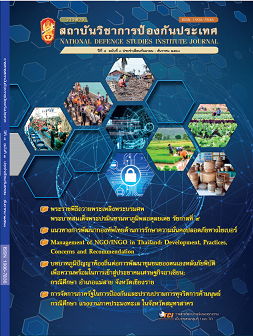การจัดการภาครัฐในการป้องกันและปราบปรามการทุจริตการค้ามนุษย์ กรณีศึกษา แรงงานภาคประมงทะเล ในจังหวัดสมุทรสาคร
Main Article Content
Abstract
บทคัดย่อ
วัตถุประสงค์สำคัญของการวิจัยนี้ ก็เพื่อศึกษาสาเหตุการค้ามนุษย์ การจัดการภาครัฐในป้องกันและปราบปรามการทุจริตการค้ามนุษย์ อีกทั้งปัญหาและอุปสรรคการจัดการภาครัฐในการป้องกันและปราบปรามการทุจริตการค้ามนุษย์ กรณีศึกษา แรงงานภาคประมงทะเลซึ่งเป็นการศึกษาระหว่างการวิจัยเชิงคุณภาพและปริมาณการวิจัยเชิงคุณภาพนี้ข้อมูลได้มาจากเอกสาร การสังเกตการณ์ และการสัมภาษณ์แบบเจาะลึกกับผู้ให้ข้อมูลทั้ง 12 ท่าน เครื่องมือในการเก็บข้อมูลคือ แบบการสัมภาษณ์กึ่งโครงสร้าง ข้อมูลเชิงคุณภาพที่ได้ทำการวิเคราะห์เนื้อหา การบรรยายพรรณนา และการอุปมัยเชิงวิเคราะห์ นอกจากนี้มีการวิเคราะห์เชิงสามเส้าเพื่อยืนยันความถูกต้องส่วนการวิจัยเชิงปริมาณนั้น กลุ่มตัวอย่างได้แก่ ผู้ใช้แรงงานด้านประมงจำนวน 400 คน เครื่องมือที่ใช้เก็บข้อมูลเชิงปริมาณ ได้แก่ แบบสอบถามและได้ถูกวิเคราะห์โดยใช้สถิตพรรณนา (ความถี่ ค่าเฉลี่ย และส่วนเบี่ยงเบนมาตรฐาน)
การวิเคราะห์ข้อมูลเชิงปริมาณและคุณภาพ พบว่าสาเหตุของการค้ามนุษย์ โดยเฉพาะด้านแรงงานประมงทะเล ส่วนหนึ่งเป็นเพราะแรงงานทางด้านนี้ขาดแคลน นอกจากนี้ในอดีตการบังคับใช้กฎหมายและกฎระเบียบเกี่ยวกับการค้ามนุษย์ไม่ได้เข้มงวด และการลงโทษผู้ทำความผิดก็ไม่รุนแรง ทั้งยังไม่มีการกำหนดเขตที่พักอาศัย การประสานงานและการบูรณาการ แต่ปัจจุบันคณะรักษาความสงบแห่งชาติได้ดำเนินการในการป้องกันและปราบปรามการค้ามนุษย์โดยเฉพาะด้านแรงงานทะเล โดยทุกภาคส่วนที่เกี่ยวข้องได้ร่วมกันบูรณาการ มีการกำหนดรับบทลงโทษที่รุนแรงและเด็ดขาด และ ประชาชนมีส่วนร่วมในการช่วยตรวจสอบดูแลผลการวิเคราะห์ข้อมูลเชิงปริมาณ พบว่า แรงงานประมงชาวต่างด้าวส่วนใหญ่เป็นเพศชาย อายุ 26 ปีมีระยะเวลาที่ทำงานประมงทะเล 4 ปีวุฒิการศึกษาน้อย มีข้อเสนอว่าการคอร์รัปชั่นควรได้รับการแก้ไขเยียวยาอย่างเร่งด่วน พนักงานของรัฐไม่ควรจะได้รับอนุญาตให้ใช้ดุลยพินิจ และควรจะละเว้นการข่มขู่หรือบังคับผู้ใช้แรงงานฯและไม่ควรอนุญาตให้ผู้ประกอบการมีอำนาจผูกขาดเกี่ยวกับการประมงทะเล
คำสำคัญ : การจัดการภาครัฐ/การป้องกันและปราบปรามการทุจริต/การค้ามนุษย์/แรงงานภาคประมงทะเล
Abstract
The objectives of this research as study the causes of human trafficking about Public Sector Management in the Prevention and Suppression of Trafficking Fraud, the problems and obstacles in governmental management in the prevention and suppression of human trafficking fraud. This is a study between qualitative and quantitative research. This qualitative research is based on documentation, observation and the in-depth interview with 12 contributors by Semi structured interview Qualitative data that analyzes the content, descriptive lectures and analytical metaphors. In addition, there is a triangulation analysis to confirm the accuracy. Quantitative research is the samples were The 400 fish labors were employed. Quantitative data collection tools were questionnaires and were analyzed using descriptive statistics (mean frequency and standard deviation).
Analysis of quantitative and qualitative data reveals the causes of trafficking. Especially sea fishing labor, it is partly because of the labor shortage. In addition, in the past, enforcement of laws and regulations on trafficking has not been rigorous. And the punishment of the offender was not severe. There are no residential zones yet. Coordination and integration but now the National Peace Corps has taken action to prevent and suppress human trafficking, especially in the field of maritime labor. All relevant sectors have been integrated. Critical and punitive sanctions are imposed, and people are involved in oversight. The quantitative data analysis revealed that most of the migrant workers were 26 year old males working for 4 years fishing. It is proposed that corruption should be addressed urgently. State employees should not be allowed to exercise discretion. And should refrain from bullying or forced laborers. And should not allow operators to have a monopoly power over sea
Keywords :Public Management / Prevention and Suppression/ Human Trafficking / Sea Fishing Labor
Article Details
The articles, images, tables, graphs, written content, and opinions published in this journal are solely those of the authors and do not necessarily reflect the views or positions of the National Defence Studies Institute or its academic affiliates.


